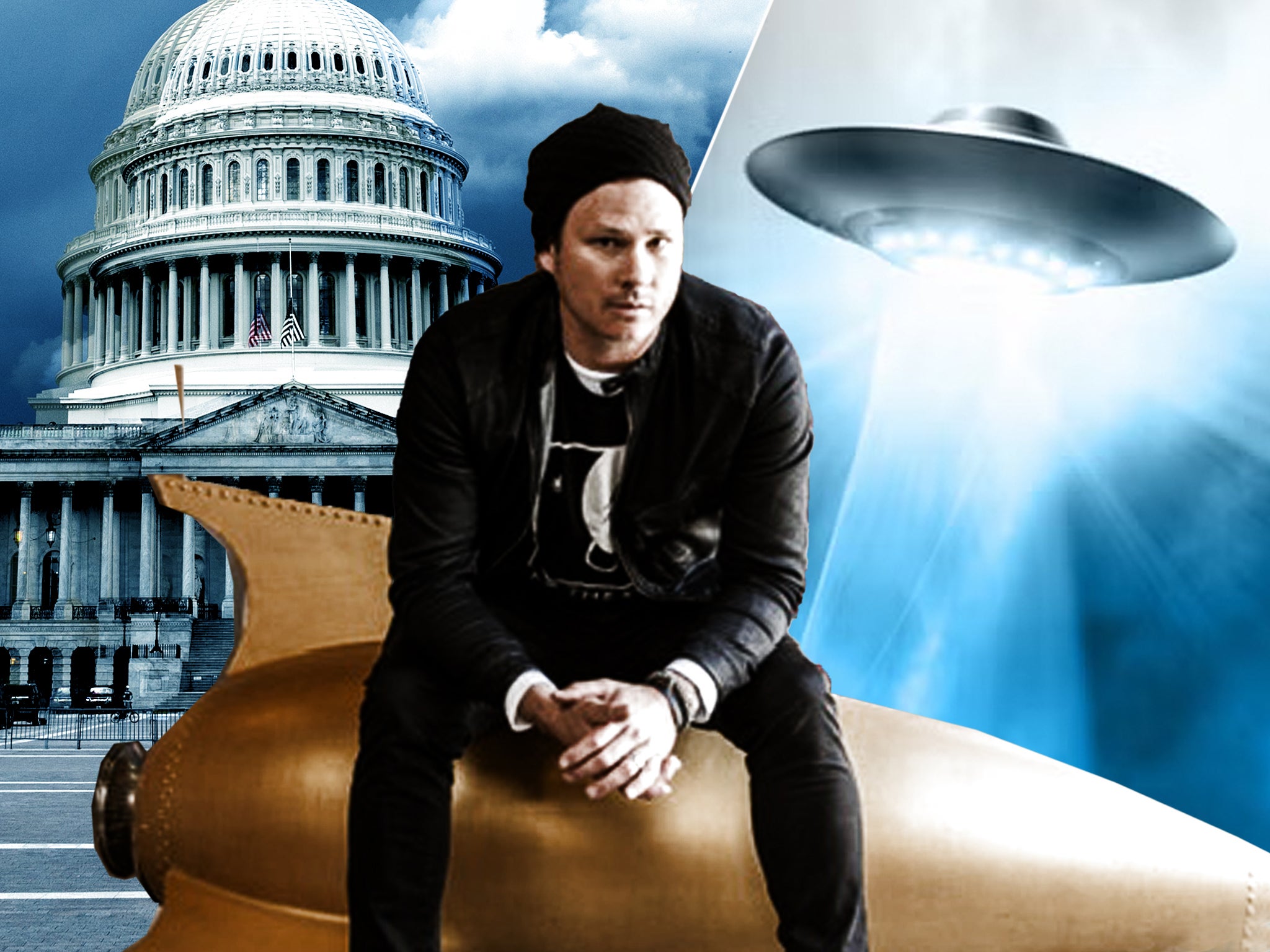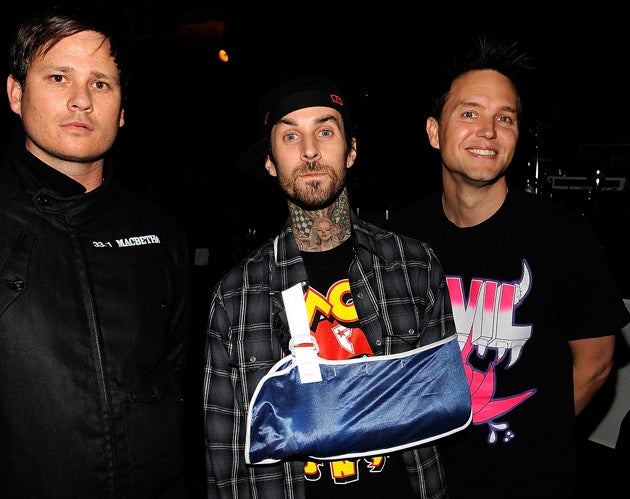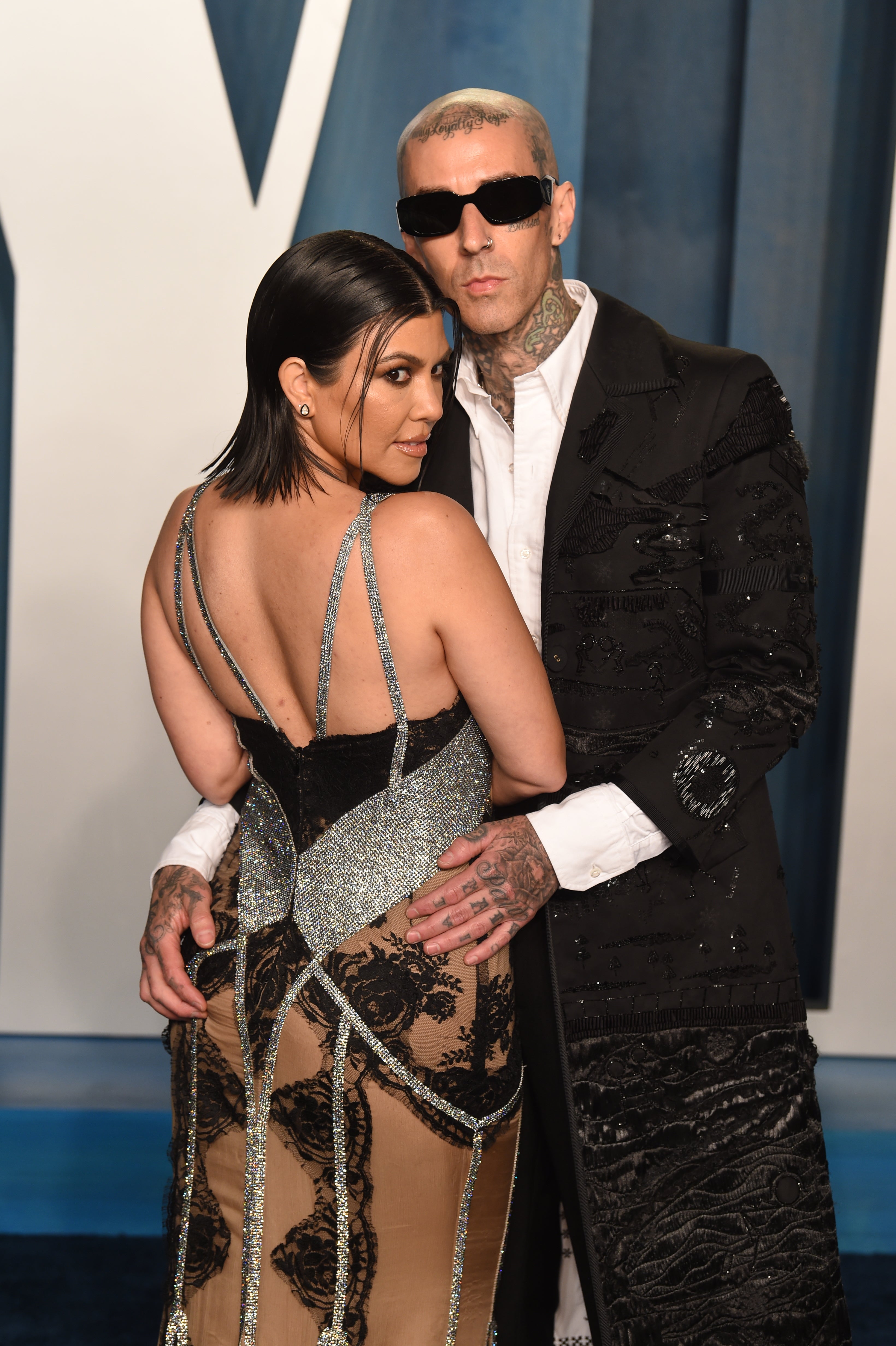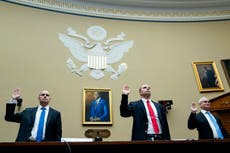Blink-182’s Tom DeLonge on his mission to prove ‘Aliens Exist’, a newfound UFO fandom - and the Kardashians
Tom DeLonge took a hiatus from Blink-182 to feed his lifelong extraterrestrial passion. Eight years later, as Congress holds historic hearings on UFOs, he tells Sheila Flynn: ‘This was all part of the plan’

Your support helps us to tell the story
From reproductive rights to climate change to Big Tech, The Independent is on the ground when the story is developing. Whether it's investigating the financials of Elon Musk's pro-Trump PAC or producing our latest documentary, 'The A Word', which shines a light on the American women fighting for reproductive rights, we know how important it is to parse out the facts from the messaging.
At such a critical moment in US history, we need reporters on the ground. Your donation allows us to keep sending journalists to speak to both sides of the story.
The Independent is trusted by Americans across the entire political spectrum. And unlike many other quality news outlets, we choose not to lock Americans out of our reporting and analysis with paywalls. We believe quality journalism should be available to everyone, paid for by those who can afford it.
Your support makes all the difference.The onstage banter from the Blink-182 boys – now middle-aged fathers – has barely changed in a quarter-century. Still steeped in SoCal skater style and jack-this-job attitude, the band kicked off a 2023 tour in May, interspersing dude jokes and high school humour with the pop-punk anthems that their devoted fan base grew up with. There’s a tinge of nostalgia to the wistful immaturity both on stage and in the crowd as the Blink trio – and many of their elder millennial fans – sing along to the same lyrics with the knowledge that everything, everywhere, is different.
Because this tour is significant in more ways than one. The band is travelling with families in tow, and they’re travelling not by Warped bus but by private jet – aside from Travis Barker, who opts for other transportation after surviving a deadly plane crash in 2008. The drummer has garnered perhaps the most headlines from this recent rash of performances, given his marriage to Kourtney Kardashian and her pregnancy announcement at a Blink-182 show in June – with a handwritten sign, no less.
Mr Barker and vocalist/guitarist Mark Hoppus reunited for this tour with band co-founder Tom DeLonge after his latest hiatus; the 47-year-old has become nearly as well known for his exploration of the extraterrestrial as he is for his nasal vocals and playfully juvenile lyrics. And there are times during Blink-182 shows when Hoppus tells the crowd: “Tom was right.”
Twenty years after the pair co-wrote 1999’s “Aliens Exist” – singing ‘I know the CIA would say / What you hear is all hearsay / I wish someone would tell me what was right’ – the US military acknowledged videos first released by the New York Times and Mr DeLonge’s organisation, To The Stars Academy of Arts & Sciences (TTSAAS). NASA has convened an independent panel with public hearings to study UFOs, formally known as unidentified aerial phenomena (UAPs), with a report due out in coming weeks. And the House Oversight Committee just last week heard testimony from whistleblowers about unexplained sightings in yet another historic step.
This new trend towards transparency, according to Mr DeLonge, is going exactly according to his plan.
“Everything that is happening right now is 100 per cent because of To The Stars,” Mr DeLonge tells The Independent by phone from his hotel before the band’s Atlanta show in July. “I mean, I've known this, and my guys know this ... we really feel, in our company, we've really changed the course of the world.”
He’s speaking with a satisfied confidence – a marked difference from the informed humility which Mr DeLonge says helped him form the organisation in the first place.

A Southern California native who founded Blink-182 as a teenager with Mr Hoppus, the musician had nurtured a long-term fascination with life beyond Earth when he created To The Stars, an entertainment company, in 2014, before quitting the band a year later. In 2017, he expanded with TTSAAS, recruiting a stable of UFO hotshots to advise his organisation. He’d done his research, he says, and had the sense to tread softly – with a dogged diplomacy likely foreshadowed by his gig-booking persistence all those years earlier during the band’s infancy.
“I just cannot believe, like, the audacity I had at that time, because I was just flying by the seat of my pants,” Mr DeLonge says of his entry into the upper echelons of UFO research. “But honestly, I think the fact that I studied this for 25 years, and I knew things about it and took it very seriously ... Honestly, I don't know if people would think that a musician would take it as humbly as I did, but I really did.”
Mr DeLonge officially launched the academy wing of the organisation in 2017 as a public benefit corporation comprised of a “consortium of scientists, aerospace engineers and creatives that will work collectively to allow gifted researchers the freedom to explore exotic science and technologies with the infrastructure and resources to rapidly transition innovative ideas into world-changing products and services.”
Its roster of ex-government employees helped ease into work alongside official agencies, often putting the musician into the same room, he says.
“When you're meeting with these people within government, and you understand what the subject’s about, you kind of really have a respect for the enormity on their shoulders and what they're dealing with,” he says. “And so I was really humble about what my asks were; I was really respectful about security programs and their security clearances and their classified programs. So I really knew how to navigate, like, not getting them in trouble, but creating a framework of how we can push the ball down the field. And I always delivered on what I said I would do, and I was always willing to learn a better way of doing it, you know, and I think that going in with that kind of modesty for the subject was really what got me there.”

He concedes, however, that “the first few that I sat with ... my heart was pounding, and I was shaking, but I had to pretend that I wasn't – because it's one thing to think something's real, and it's another thing to sit with somebody that has stars on their shoulders saying, ‘This is absolutely real, and you don't know the stakes.’ And then you kind of go, ‘Well, my little childhood fascination with the unknown is now as real as a car on the road.
“And that'll keep you up at night.”
Among his initial team were Luis Elizondo, former director of the Advanced Aerospace Threat Identification Program (AATIP), and Chris Mellon, deputy assistant secretary of defense for intelligence during the Bill Clinton and George W. Bush administrations. Members of the current To The Stars advisory board currently include company co-founder Dr Hal Puthoff, a physicist and parapsychologist who led secret government-funded research into psychic abilities, with whom Mr DeLonge is in regular contact.
“Obviously, I’m not a government guy,” Mr DeLonge tells The Independent, but “all of us working together – myself being able to put a business vehicle together and being able to have a loud or a larger mouthpiece than a normal individual, but then also having the guys that ran the programs ... these guys that were actually there, and were able to go and talk to different people on the Hill ... then everyone was able to really not only hear our voice, but they were able to take it seriously.”
His company has achieved a number of bombshell coups. After it released three declassified videos recorded by Navy pilots that appeared to show UFOs, the military in 2019 acknowledged the footage’s legitimacy. The same year, To The Stars partnered with the US Army to study alien alloys.
In addition, To The Stars “has a piece of wreckage from a crashed vehicle of unknown origin in the Forties under contract, or defence contract, with the US Army, and that’s being studied at a national laboratory right now,” Mr DeLonge tells The Independent. “So we do have that kind of work going on that looks to be pretty interesting. There’s a lot of theories of which ways the science can lead us on that.”
To The Stars, he says, “was very involved in helping kind of helping create language within the Defense Authorization Act, the whistleblower language, by, you know, really meeting with all these congressmen and senators and everybody, getting them an understanding of what they need to do in order to get the information handled the correct way.”
According to the Blink-182 frontman, “a lot of the people that have come forward under the new whistleblower language that have been testifying to Congress under classified conditions, my team has really been a connector for a lot of those people to come forward. A lot of the guys on my team have been testifying to the task force. They’ve been going up there for hours and hours in a skiff, which is a classified facility, doing all that stuff.”
“Skiff” is shorthand for “Sensitive Compartmented Information Facility”. The Navy’s Unidentified Aerial Phenomena Task Force released a report in June, followed by the Department of Defense in 2021 announcing the creation of the Airborne Object Identification and Management Synchronization Group (AOIMSG) to “synchronize efforts” to “detect, identify and attribute objects of interests in Special Use Airspace,” and “assess and mitigate any associated threats to safety of flight and national security.”
Mr Elizondo and Mr Mellon left TTSAAS in 2020, the former noting the focus on the entertainment side, and Mr DeLonge emphasises “that’s where I’m best used.”
“My main job, now that I was able to kind of get the company up and running ... is really to communicate what's going on, what it's all about, and that's what I'm doing through film and television,” he says. “It’s more educational, but the way I’m doing it is through big media projects, motion picture, television, series, books, nonfiction, books, documentaries, all that kind of stuff.”
The History Channel aired two seasons of Unidentified: Inside America’s UFO Investigation in 2019 and 2020; To The Stars has published two Sekret Machines books, co-authored by Mr DeLonge. His directorial debut, Monsters of California, is slated for release this autumn – “about three skateboarders that get all riled up and tied up in the paranormal with the government,” Mr DeLonge explains.
“But there’s some very serious UFO information in this movie to get people fascinated and asking questions.”
That, really, is his goal –and he’s keenly aware that he has “a loud or a larger mouthpiece than a normal individual” to achieve it.
He’s also got the benefit of a literal global platform; Blink-182 kicks off the international leg of the tour in Scotland in September. During the dates throughout the US so far, he says, “I do notice that people are really excited and open to this and fascinated by the subject ... excited to learn and excited to understand and change the world view, because everyone feels stuck, and no one really knows why we're here.
“No one really knows if we're living our best life; no one’s really sure why you’ve got to go rack up college debt and go get a job you hate, and then like, marry somebody that you didn't really think through when you're in your early 20s or something,” he says, slipping into the old Blink-182 lyrical patois. “I think a lot of people are lost in life in general and looking for a better way. And this is like, ‘Oh, my God, the world is a lot bigger than I thought it was.’”
For all his research and fascination, however, Mr DeLonge’s not certain just what the appearance of alien life on Earth might mean for humanity.
“I don't know if a major event that happens now is a good thing or would scare people or what, but I just think, in general, that these things don't want to be seen, which makes me feel: They don't want us to know they're here,” he says. “And that's why I really feel strongly that people should know. And right now people want to know, and maybe they don't need to know everything, but they can know some of it, and it’s nature at the end of the day.”
Meanwhile, he’s wearing To The Stars swag onstage and meeting with high-level specialist fans – many who want to help – while calling Dr Puthoff and his roster of experts in his downtime on tour.
“We routinely get emails and people reaching out that work at places like Nasa, people that work at the big defence, aerospace companies, people that work at US universities that have government contracts. That’s really normal,” he says. “I even had two guys from the Skunk Works at Lockheed Martin at my show the other day; we hung out for quite a few hours, and they were really interested in something that I’m doing.” (”Skunk Works” is the official pseudonym for the security and aerospace company’s Advanced Development Programs, responsible for a highly-classified projects.)
Now, he says, he seems to have fans of his extraterrestrial exploits – not necessarily just his music.
“I used to have people always come up to me and go, ‘Oh, I love your band’ ... Now a lot of people come to me and say, ‘Oh my god, what you’re doing with your company’ ... it’s probably some equal mix,” he says, amused.
“I always find that kind of fun. Because when some people go, ‘Oh my god, could I have a photo’ or something, a lot of times I ask them, ‘Are you a fan of my music, or...?’ And you never know. They might say ‘No, what you’re doing with your company.’ You never know. It’s really cool.”
He may even be enlisting a new generation of musician activists.
“Even the bands that are on tour with us now are saying things from stage, and they walk into my dressing room with an entire list of questions,” he says – and he’s seen particular support from his own long-time bandmates.

“Back in the day, they were both giving me so much s*** about how often I would talk about aliens and stuff,” he says of Mr Hoppus and Mr Barker. “And Mark would roll his eyes and walk out of the room – not because he was being mean, but because we're best friends. And he was just laughing, ‘Oh, my God, get me out of here,’ you know?. And then, once it started happening, Travis was the first one that was actually a bit more interested ... he would like listen a bit more.
“Now, it's funny; Mark is really supportive. They're all supportive, but Mark is really supportive. You know, he says that every night on stage. He goes, ‘Tom was right.’ And I go, ‘I was right!’”
For his own part, he’s hugely supportive of Mr Barker’s headline-grabbing marriage to Kourtney Kardashian, sounding truly genuine when he speaks about the couple.
“That’s a world that he's in that probably comes with quite a lot of stress; I mean, they're so famous, and they have so many great things going on,” he says of Mr Barker and the Kardashian clan. “I'm happy for him. I mean, the most important thing in the world is to find someone that you care about, that you love, and I'm just so happy that he did. That's half the battle on Earth, is just finding a partner.”
The band’s rapport and relatability, he believes, have played a role in Mr DeLonge’s push to mainstream the mysteries of the universe.
“I can’t even imagine describing to you the amount of times we hit each other in the nuts right before we walk onstage,” he says. “It’s ridiculous. You would like to think we’re grown-ass men, and we’re hitting each other in the groin right before we walk onstage to 20,000 people nightly ... It’s just like, are we still 14? What are we doing?”
He says the division between that behaviour and his very heavy research work is “something I’ve thought about a lot, honestly.”
“If an actor were to do what I did, I don’t think it would resonate the same, because no one knows who actors are,” he says. “They’re acting as different people in every movie. Like, you really don’t know who Ryan Gosling is; he’s totally different in every movie, and no one has any idea, like, what’s his favorite food, what kind of music does he listen to or what does he do on the weekends.

“But when you’re in a band that’s like Blink-182, you know we’re Southern California kids, I grew up skateboarding, you know the types of jokes we make, you know the music we listen to, you know the way we dress, you know everything about us. And that’s what a good rock and roll band does. Our job is to be very authentic and regurgitate the world through our own point of view and see if it aligns is with you.
“And if it aligns with you, you’re going to dress the same, you’re going to hang out with similar people, you’re going to listen to that music, and you’re going to adopt that kind of vernacular, and so I think it works really well. Because people trust and know who we are as people, or myself, in this case, to where, when I bring this stuff up –and I’ve been talking about this stuff for decades, and I have songs about it – I think people just see a different type of authenticity with it.”
He also, he says, feels a huge “responsibility to see it through and to try to keep this giant train on its tracks.
“I think the biggest responsibility I personally feel at this time is to make sure that these big film projects I’m doing portray it in the right way, and portray it with integrity, and also have to be mainstream enough and captivating enough that people want to see it and want to talk about it and want to learn more,” he says. “So it’s something I take really seriously – and I feel really excited about [the fact] I can continue to do what my aim has been.”
And the aim of Blink-182, which has permeated nearly every level of society to date – from reality shows to congressional hearings – has always really been heart. At this stage, the band has formed the soundtrack of countless lives, and the import of that fact is not lost on Mr DeLonge.
“We’re actually a much better band than we've ever been,” he tells The Independent. “So when we play the old songs, they almost sound new. But the old things have all this nostalgia and legacy to them in some respects ... it's like a dichotomy of being something people grew up on, but we're delivering it in a new way that's like, ‘Aw, we wished you guys were this good years ago!’ It's like, ‘We did too! We’re learning how to play finally!’ But we're just kind of a weird band, in the sense of where we really are three kids from a garage and never really took ourselves seriously. And I think that was part of the charm.”
Whether charm or grit or strategy, Mr DeLonge is now watching with gratification as the US government – far more openly – explores the very same topics he’s been banging on about since the inception of his career.
The House Oversight subcommittee on national security spent the morning of 26 July hearing from testimony from whistleblowers and witnesses regarding reports of unidentified anomalous phenomena – after a House panel last year held the first public congressional hearing on the subject in more than half a century.
“I never say that I feel vindicated, because I knew this was coming,” he says of the latest hearing. “This was the plan. I mean, To The Stars, we made a plan to do exactly what we did, which is ... get these videos out there, brief all the committees in Congress, bring all the people forward to talk to the senators and congressmen, get the law changed so whistleblowers can come forward, create a UFO Task Force that the people own that's under the elected leadership, get the whole world working together, and and so on and so forth.
“And so it's all happening, so I never really felt vindicated like, ‘Oh my gosh, finally, everyone understands that I'm not crazy.’ This was all part of the plan. So I'm just sitting back and letting it do its thing. And for myself, now, I feel the same thing that I've always felt about this subject. There's some really scary aspects to this subject, and there's some really enlightening, exciting aspects to this subject, just like anything else in nature.
“I think that we have the ability to really come together and learn a lot more about who we are as human beings and the things that we think separate us – everything from geography to religion to skin colour to all these artificial constructs that we have in place that think that we're different from each other. It's not the case – and I think that I think that, you know, we have a really a really great future, once we all start realising that our ideas of what we are, what history is, and what the universe is, once we learn that those things don't work anymore, I think it's going to be a really interesting time for us.”




Join our commenting forum
Join thought-provoking conversations, follow other Independent readers and see their replies
Comments